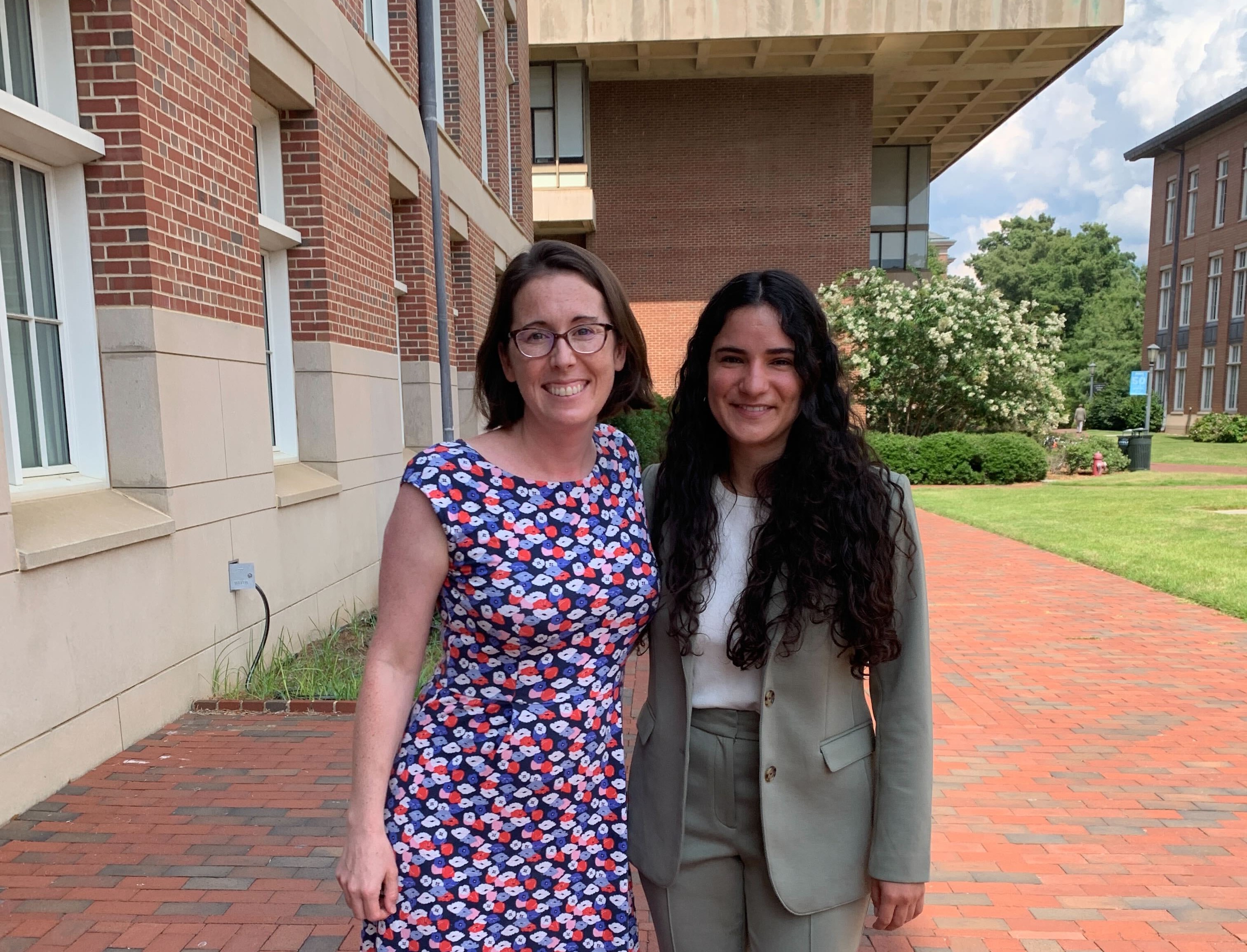Leadership and Lasting Impact: Reflections with a Carolina alumna

Rodriguez, UNC Chemistry PhD ’22, celebrated her thesis defense with mentor, advisor and Bowman and Gordon Gray Distinguished Term Professor Jillian Dempsey (left).
June 24, 2025 | By Emily Sherman
When Tayliz Rodriguez arrived at UNC Chemistry, she wanted it all: not just a doctorate, but a supportive community to grow with her, the freedom to pursue her passions, and the skill set to tackle anything that came her way. From investigating untreatable diseases and sustainable energy storage to creating programs for a more connected Carolina, Rodriguez crafted a dynamic Ph.D. experience that enabled her to thrive in the halls of Kenan and in BASF’s prestigious Leadership Development Program.
Rodriguez, a UNC Chemistry Ph.D. alumna, always loved a challenge. Drawn to the complexity of life at the atomic level, the Puerto Rico native arrived in Chapel Hill for a coveted NSF Research Experience for Undergraduates. As a member of the Waters Lab, Rodriguez and graduate mentor Lauren St. Louis developed a method to control the three-dimensional shape of peptide therapeutics — proteins that could cure currently untreatable diseases like cancer and Alzheimer’s.

“My favorite memory from that summer was synthesizing a peptide for the first time — not on an automated synthesizer, but by hand,” said Rodriguez. “The process of linking together each amino acid in the peptide chain piece by piece took an entire week and the help of all the Waters Lab graduate students. By the end, I had a much deeper understanding of peptide chemistry and had made something that could cure diseases. The Waters Lab community valued and encouraged my learning and gave me a picture of what research at UNC Chemistry could and would be.”
After earning her B.S. in Chemistry from Florida International University, that vision catalyzed Rodriguez’s decision to return to Chapel Hill for graduate school, where she lost no time in jumping into the Chemistry community in and out of lab. While co-leading Allies for Minorities and Women in Science (AM-) and representing fellow graduate students on the Chemistry Diversity and Inclusion Committee, Rodriguez saw an opportunity to connect incoming graduate students with their peers. The Graduate Achievement through Mentoring (GrAM) program, now in its 3rd year, partners current and new graduate students to answer questions, provide support, and ease the transition into graduate school.
“I think it’s critical for students to have support on all fronts — from peers, mentors, and our department,” said Rodriguez. “That enables us to implement initiatives that advocate for the Chemistry community as a whole.”
As co-chair of the Graduate Committee for Professional Development, Rodriguez also helped establish Industry InSight, a two-day long celebration of science that connects hundreds of UNC students with industry representatives to share ideas and build professional networks.
“Initiative and connectivity are must-haves for strong leadership,” said Rodriguez. “Leaders don’t just have a vision: they take initiative to bring it to life and work with a diverse team to find out how. By choosing to get involved with these committees, I was able to build confidence in taking charge and learn effective interpersonal skills which have been crucial to my professional impact at BASF.”
After spending her graduate career investigating charge transfer excited state chemistry for next-generation energy storage in the Dempsey Lab, the NSF Graduate Research Fellow earned a spot in the competitive BASF Leadership Development Program (LDP), which took her far from her field of expertise and her comfort zone. From scouting sustainable energy projects at the University of California at Berkley, to synthesizing new materials to transport biocatalysts in New York, Rodriguez took on some of today’s biggest scientific challenges. Now, she has returned to North Carolina and entered yet another new field at BASF: designing chemical additives that go into everyday materials like paints, adhesives, construction materials.
“At its core, a PhD is bigger than just one area of expertise,” said Rodriguez. “It enables you to quickly grasp new ideas and contribute to new projects. Throughout BASF’s LDP, I encountered problems in fields I had never studied, but the skills I earned during my PhD gave me – and my employer – confidence that I was up for the challenge.”
Reflecting back on her experience, Rodriguez characterized her Ph.D. experience at UNC as “dynamic.”
“I found numerous opportunities to grow as a scientist and leader — all while being supported by my peers and mentors like Marcey Waters and Jillian Dempsey. I found that taking advantage of opportunities like these is crucial to developing as a leader, no matter what career you pursue.”

